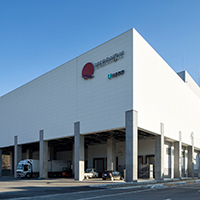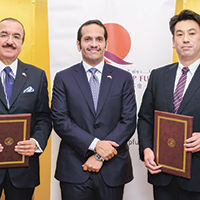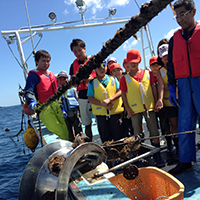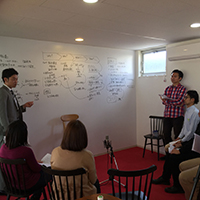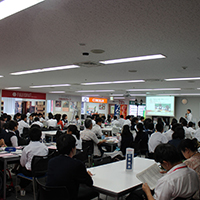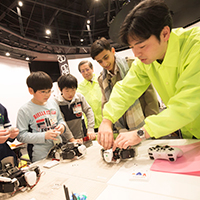The Qatar Friendship Fund (QFF) was created with a $100 million donation to support the relief efforts for the victims of the 2011 Great East Japan Earthquake in Tohoku.
Operating under the auspices and direction of the Emir of the State of Qatar Sheikh Tamim bin Hamad Al-Thani, the fund has provided financial assistance to 12 projects that cover four fields respectively — children's education, fisheries, health care and entrepreneurship.
Marine business critical
Recovery and development of the fishing industry is essential for the residents in Tohoku to rebuild their lives and the region's economy, which was heavily devastated by the quake and ensuing tsunami.
Named after a traditional Qatari fishing technique, Maskar is a multifunctional fish freezing and storage facility in Onagawa, Miyagi Prefecture, constructed in 2012 as the first project supported by the QFF.
Yoetsu Ishimori, vice president of the Onagawa Fish Market Buyers Cooperative, said the tsunami-resistant facility at the port provided area fish workers with a sense of safety, allowing them to resume their work.
Ishimori explained a conventional flat facility with refrigerator on the ground at the time of tsunami could heavily damage stock and commodities, causing fear of waves and hesitation about doing their business in the area.
But the three-story Maskar, built by Taisei Corp. in corporation with The Nippon Foundation, is equipped with 6,000-ton refrigerators on the second floor. Moreover, the facility features exterior walls on the first floor that fall off when hit by tsunami, which subsequently passes through it.
After completion of the $25 million facility, Ishimori said, "More and more fish-processing plants have been built around here, enabling us to take a step toward reconstruction."
Thanks to Maskar, the recovery of the industry and the town has advanced more rapidly than he expected, Ishimori said. "Maskar is a symbol of our reconstruction."
Meanwhile, to further accelerate reconstruction of Onagawa, the QFF signed an agreement with Onagawa Mayor Yoshiaki Suda on Oct. 3 for ¥1 billion to build a unified elementary and junior high school in the town.
Sustainable nature
Child education is another crucial field the QFF strongly sponsors. Given $6.6 million for renovation, Moriumius Lusail is an accommodation facility for children, created in an abandoned school building that was built in 1923 in the Ogatsu area in Ishinomaki, Miyagi Prefecture.
Surrounded by forest and near the ocean, the Ogatsu facility, which opened in July last year, aims to allow children to experience life with nature and natural cycles under the key word of sustainability, explained Director Gentaro Yui.
Moriumius is a combination of words in Japanese meaning mori (forest), umi (sea) and "us," which sounds similar to the Japanese asu (tomorrow), and the literal meaning of "us," while Lusail is named after a historically significant Qatari city.
He noted that staying at Moriumius enables children to engage in such activities as tree thinning and planting in the woods, while engaging in fishery activities, including catching oysters, scallops and sea squirts with local anglers in the ocean, as well as to farming in area fields.
Yui also said the facility could serve as a place to connect people, including area residents, while contributing to the development of the area, which has suffered population decline, especially after the March 2011 disaster.
"Providing education for children is the primary purpose of this facility, but I really hope the area will be rejuvenated through people's interactions," he said.
He also said the QFF provided many people with opportunities to get to know the Middle Eastern country, hoping the facility will prompt further exchanges between the two countries. "We're arranging to have children from Qatar visit, hopefully by the end of the year," Yui noted.
Scientific study
With help from the QFF, Tohoku University's School of Engineering in Sendai launched the Qatar Science Campus (QSC) project in July 2014 to enable children to experience advanced scientific research and to attend manufacturing classes by leading firms.
The engineering school already had science programs for elementary school students, but the contents were limited to basic experiments, said Takeshi Yamaguchi, an associate professor of the Graduate School of Engineering and a coordinator of the QSC.
"We wanted to expand the scope of our science programs for children and secure the quality of education for those in disaster hit areas," Yamaguchi explained as the reason to seek assistance from the QFF. "Additionally, we hoped to foster young people who want to pursue scientific careers and take on roles in the manufacturing industry."
Using $2.6 million, the school established facilities, including the QSC Hall, which is equipped with a 270-degree projection system, and Solar Valley with solar panels to generate power to supply some of the electricity the facility requires.
Yamaguchi said thanks to the launch of the QSC, the school successfully expanded its connection with various companies, allowing it to hold "experience-based science classes" mainly on weekends throughout the year, with programs that include learning programming, the structure of a motorcycle engine, participating in a robot workshop and creating a camera lens.
Other programs the QSC project offers include "factory tours" that provide students with an opportunity to visit manufacturing companies in Miyagi Prefecture and "laboratory tours" at the university.
The project has proven successful with the number of participants taking part increasing to 3,125 in the 2015 academic year, up from 2,454 the previous year.
"The QSC site became a symbolic enlightenment hub that children look forward to visiting," Yamaguchi said proudly.
The QSC hosted a group of 15 Qatari students to a week-long series of workshops in November. Future visits are being planned to foster cross-cultural and educational exchanges between Qatar and Japan.
Providing life experience
As another example of providing various educational opportunities, the QFF provided $6.3 million for the establishment of Elem (education in Arabic) in Sendai, as well as Iwaki, Fukushima Prefecture, a joint program with Japanese non-profit organization Junior Achievement that offers students career experience and opportunities to think about how to spend their salaries in real-life situations.
At Elem in the two cities, elementary school students visit a facility dubbed "Student City," while junior high school students call on a site named "Finance Park."
At the former, visiting students work in shops or offices in a simulated environment to learn how society works as they conduct their businesses. At the latter, they are given a status featuring age, family makeup and annual salary and make their own life plans, learning how to best spend within their incomes.
The city of Sendai uses the program to further develop its career education as part of nurturing people to be socially and occupationally independent, explained Nobuhisa Tagano of the school education division at the city's education bureau.
Tagano said the city appreciates the aid by the QFF as it has provided valuable opportunities to reconsider the importance of career education from a long-term perspective.
Since its launch in August 2014 in Sendai, around 14,000 elementary students participated in the program, while around 8,000 junior high school students took part, according to Tagano.
Entrepreneurial spirit
The QFF places a great deal of importance on fostering entrepreneurship, believing that innovators could have a positive impact not only on local communities, but also on society.
To this end, the INTILAQ Tohoku Innovation Center was built on the outskirts of Sendai in February with $14.8 million in aid and is operated by IMPACT Foundation Japan, which has engaged in nurturing Japan's next generation of global leaders. Intilaq means start, or launch in Arabic.
The center provides paid working and office spaces, as well as rooms for lectures and meetings. It features a broadcasting studio that enables users to broadcast online. In addition, it houses a large lecture theater with a 110-person capacity.
"Entrepreneurship in a broad sense means to take on a new challenge, which is all about the spirit of taking a step forward," Hiroshi Sasaki, education director at the INTILAQ center, stressed. "We'd like to attract those who want fresh challenges to this facility and spread such a spirit."
Since opening, INTILAQ has held about 40 events, including various seminars and workshops at the facility, drawing nearly 1,000 people, Sasaki said.
"We actively work to hold workshops on entrepreneurship for children as we think it's necessary to cultivate the entrepreneurial spirit at a young age," Sasaki noted, adding that INTILAQ has held some events targeting youth including a workshop on starting a business for elementary school students and a seminar on innovation for high school and college students.
Sasaki hopes the site will serve as a hub for entrepreneurship in Tohoku and connect the world in the end.

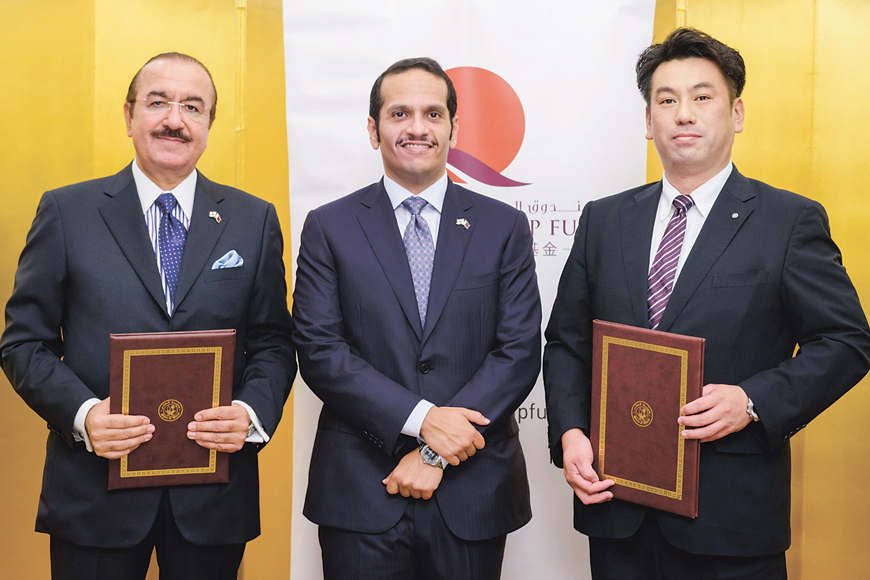
 Click to enlarge
Click to enlarge